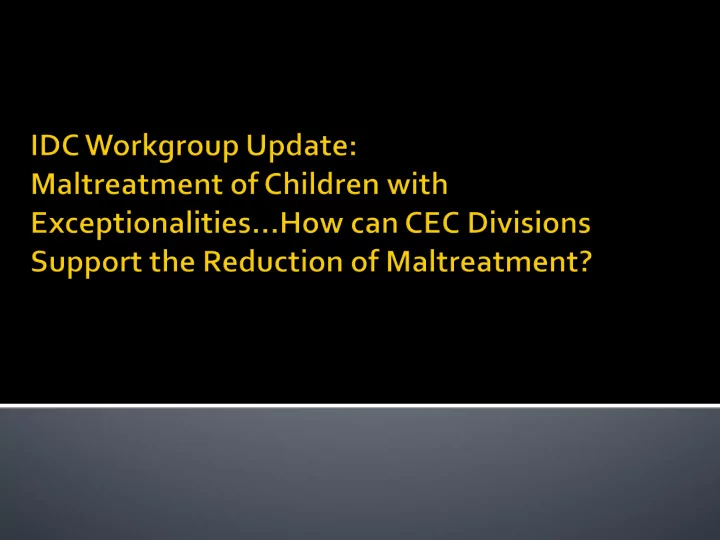

The “ odds ” that MALTREATMENT will happen, e.g., , ▪ “ Children with disabilities are among the most vulnerable members of society. ” (UNICEF, 2013) ▪ Children with disabilities are three times more likely to experience maltreatment than their nondisabled peers (Sullivan & Knutson, 2000). ▪ It is estimated that 25+% of children with disabilities will experience one or more forms of maltreatment between birth and 18 years of age (Jones et al, 2012). ▪ = 1 in 4 will experience abuse and/or neglect ▪ = 1 in 2 will experience bullying ▪ = 9 in 10 will see another student being bullied The risk is MUCH greater than most realize! IDC Workgroup Update San Diego CA 2015 2
The IDC established the Maltreatment Workgroup in 2014 to build on the work of the Division for Communicative Disabilities and Deafness (DCDD) and to extend the work ’ s impact into the divisions of CEC . Workgroup members: Harold Johnson, DCDD Past President Debbie Lively, DCDD, President David Cihak, DADD, President Elect Jamie Hopkins, CEC-PD, Past President Laurie VanderPloeg, CASE, IDC Vice Chair Laurie deBettencourt, TED, Vice President Bill Bogdan, IDC Chair IDC Workgroup Update San Diego CA 2015 3
The IDC “ Motion ” To Act… "IDC supports the inclusion of safety IFSP statements and IEP objectives in the educational planning documents of children with disabilities." (approved 6/10/14) The Appointment of the IDC Maltreatment Workgroup Charge to the Workgroup Sharing the motion with CEC division leaders and members (Achieved) Information Collection (Achieved) Data Base Development(in progress) Proposed Enhancements to CEC Standards, Policy, Position Papers (in progress) IDC Workgroup Update San Diego CA 2015 4
Purpose: To gain information regarding CEC Divisions ’ and members ’ knowledge and practices related to risks and prevention of maltreatment of children and youths with disabilities/exceptionalities. ▪ Prepared Survey and sought IRB approval, October/November/December 2015 ▪ Conducted Online survey through division leadership, January 2015 ▪ Compiled and analyzed results, February 2015 ▪ Developed Showcase Panel presentation, March 2015 ▪ Disseminate full report at CEC 2015 “ Showcase ” presentation IDC Workgroup Update San Diego CA 2015 5
Respondents indicated the issue of child maltreatment is very important (70%) or somewhat important (20%) to the mission of their Division. However, regarding the provision of resources and PD on topics related to child maltreatment ▪ 17% of respondents indicated their Division does provide resources ▪ 19% of respondents indicated their Division does not provide resources ▪ 64% of respondents do not know what resources are provided by their Division IDC Workgroup Update San Diego CA 2015 6
Members were asked if they, or their Division, supported the Interdivisional Caucus ’ motion to include a safety statement about preventing neglect, abuse and bullying as part of a child ’ s IFSP or IEP documents, they responded: Self- 71% ( n = 155) supported the motion 11% ( n = 25) did not support the motion 17% ( n = 38) were unsure Division- 72% of respondents indicated they do not know if their Division supports this motion 17% indicated their Division is very supportive IDC Workgroup Update San Diego CA 2015 7
Data indicate a general consensus regarding the need for training with 80% or more participants responding favorably to the statements. Topics: reporting, risk factors, identification, prevention practices, and assessment 88% of respondents agreed there is a need for research related to the maltreatment of children with disabilities. IDC Workgroup Update San Diego CA 2015 8
Risk Factor : #1. Do not understand what constitutes maltreatment Student can identify (e.g., draw, tell, write, or role play) 3- 5 positive behaviors that “ x ’ (e.g., a parent, sibling, relative, adult, friend, etc.) demonstrates when interacting with them. Instructional Strategies : ? Match with existing instructional work: ? IDC Workgroup Update San Diego CA 2015 9
Please Come For a Full Report…Thursday 2:15 3:15 p.m.Convention Center: 030 AB IDC Workgroup Update San Diego CA 2015 10
Recommend
More recommend